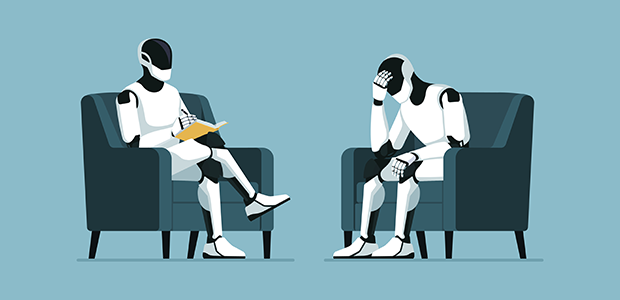
How the tech industry can leverage AI to support emotional health
Working in tech often comes with its own set of challenges, leading to high levels of stress. Driven by tight deadlines, imposter syndrome, and the constant need to prove oneself in a male-dominated field, emotional wellbeing can take a hit.
But what if there was a way to offload some of that mental burden, without judgment, without waiting for an appointment, and with the precision of the most highly trained coach or therapist?
AI: your judgement-free, always-on emotional ally
One of the most powerful benefits of AI for emotional health is its complete lack of judgment. In tech environments, where feedback is often direct and performance-driven, AI offers a neutral space free from the biases or personal opinions that can cloud the conversation. AI simply listens, processes, and responds based on logic and learned patterns.
Whether it’s a journaling app, a therapeutic chatbot, or a more advanced AI designed to help you explore your inner world, AI offers a safe, neutral space to express and explore.
It doesn't replace human connection, but sometimes, it's easier to be honest with a machine than risk feeling misunderstood by a colleague, manager or mentor.
Beyond venting: pattern recognition as self-discovery
One of AI’s most powerful features isn’t just its ability to respond, it’s how well it can observe. Emotional health isn’t just about what you say in the moment; it’s about the deeper threads, recurring thoughts, subtle changes in tone, repeated patterns of behaviour. These are often hidden even from ourselves.
AI can spot burnout before you do – tracking subtle language shifts, emotional loops, and hidden patterns even you haven’t consciously noticed. It can spot phrases that signal self-sabotage or imposter syndrome. Unlike even the best coach or therapist, it remembers everything you’ve said and gently reflects the patterns back to you. This kind of awareness isn’t just supportive, it’s transformational for professionals in tech.
AI can also identify emotional patterns in e-mails or transcripts of meetings. Describe a situation, and it highlights what’s really going on beneath the surface, cutting through emotional static to reveal clean, actionable insight.
Its lack of emotion isn’t a flaw. It’s a feature. AI reflects emotional patterns with clarity, offering grounded feedback that’s unaffected by ego or reactivity.
Precision matters: why general AI misses what custom tools catch
Let’s be clear: asking ChatGPT or Claude how to manage stress might give you something useful – but often, it’s surface-level. General AI offers general feedback. For high performers navigating nuanced emotional terrain, that’s not enough.
That’s why dedicated, purpose-built AI tools are essential.
Just as you wouldn’t measure a circuit board with a tape measure, using a general AI chatbot for deep inner work and leadership support is the same. It gives rough feedback, general affirmations, and generic insights.
In high-performance environments – code, architecture, or consciousness – general tools lead to general outcomes. Precision tools unlock breakthroughs.
Meet your AI emotional support squad (custom-made and game-changing)
To go beyond surface-level “feel better” advice and actually create emotional clarity and momentum, these are the high-impact tools that matter most, especially for professionals navigating the complexity of leadership and innovation:
- Authority mode – your personal leadership mentor in your pocket. This tool helps you step back from emotional reactivity and craft a clear, direct, and empowered response, especially in challenging conversations. It shows you what’s really at play beneath someone’s words, then helps you respond in a way that’s emotionally clean, deeply grounded, and unshakably authoritative
- Limiting belief buster – it identifies outdated inner scripts like “I’m not ready” or “They’ll think I’m too much,” traces where they came from, and helps you rewire them using transformational logic and emotional clarity
- Fraud-less imposter syndrome eliminator – tracks subtle signals of self-doubt, reframes distorted thinking, and anchors you back in your real achievements – so you lead with calm confidence, not compensation
- Decision de-coder – when you’re stuck in analysis paralysis, this tool helps you cut through noise and self-doubt. It weighs logic, values, and emotional resonance to clarify your best next step, even in high-stakes moments
Tools like these are especially useful in tech environments where multitasking, pressure, and high stakes can cloud clarity. With AI, you don’t have to wait for the “right moment” or the next scheduled session.
A cultural shift waiting to happen
This isn’t about replacing therapists or eliminating human support systems. It’s about filling a very real gap between sessions, meltdowns, and the moments when asking for help feels like too much work.
Working in tech, AI can be more than a convenience, it can be a game-changer. The tech industry often expects resilience without offering the tools to cultivate it. AI fills that gap, providing round-the-clock, bias-free, emotionally intelligent support. It won’t change everything, but it can change how we cope with everything, and that’s a shift worth exploring.
For more startup news, check out the other articles on the website, and subscribe to the magazine for free. Listen to The Cereal Entrepreneur podcast for more interviews with entrepreneurs and big-hitters in the startup ecosystem.

